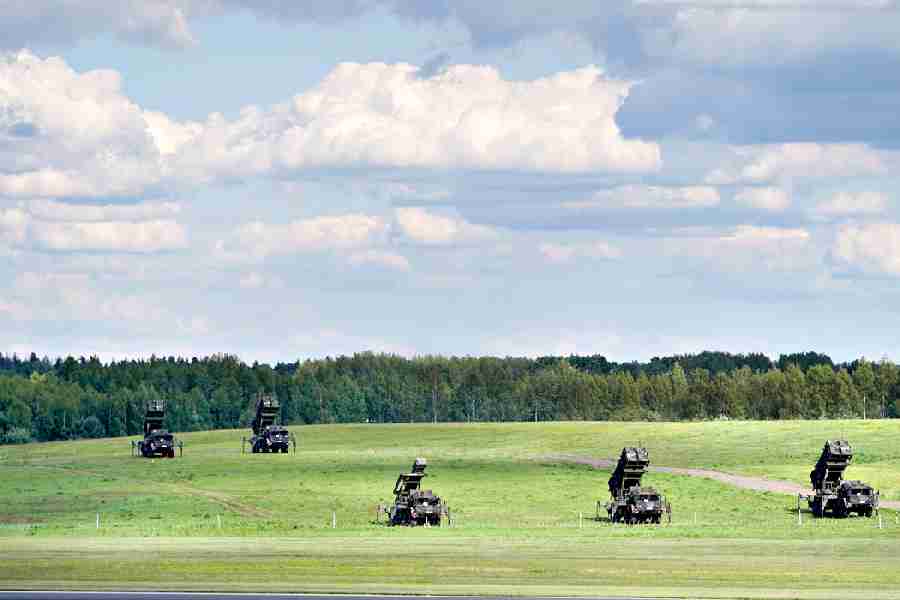Nato has turned Vilnius into a fortress defended by advanced weaponry to protect US President Joe Biden and other alliance leaders meeting this week only 32km from Lithuania’s razor-wire topped border fence with Russian ally Belarus.
Sixteen Nato allies have sent a total of about 1,000 troops to safeguard the July 11-12 summit, which will take place only 151km from Russia itself. Many are also providing advanced air defence systems which the Baltic states lack.
“It would be more than irresponsible to have our sky unprotected as Biden and leaders of 40 countries are arriving,” Lithuanian President Gitanas Nauseda said.
The Baltic countries of Lithuania, Estonia and Latvia, once under Moscow’s rule but part of both Nato and the European Union since 2004, spend above 2 per cent of their economies on defence, a larger share than most other Nato allies.
But for the region with total population of about 6 million people, this is not enough to sustain large militaries, invest in their own fighter jets or advanced air defence.
Germany deployed 12 Patriot missile launchers, used to intercept ballistic and cruise missiles or warplanes.
Spain has brought a NASAMS air defence system, France is sending Caesar self-propelled howitzers, France, Finland, and Denmark are basing military jets in Lithuania, and the United Kingdom and France are supplying anti-drone capabilities.
Poland and Germany sent helicopter-enhanced special operations forces. Others are sending equipment to deal with any potential chemical, biological, radiological and nuclear attacks.
For Nauseda, the allied effort to ensure air safety during the leader’s gathering means Nato needs to urgently set up permanent air defences in the Baltic states.
“We think about what happens after the summit ends, and we will work with allies to create a rotating force for a permanent air protection”, he told reporters.
At villages next to the Belarus border, locals told Reuters they feel totally safe, despite the Russian ally’s offer to accommodate Russia’s private Wagner militia and its hosting of Russian nuclear weapons.
“Do you think Wagner or Belarus could attack Lithuania, which is in Nato? They don’t have the guts. Nato is Nato, and we feel ourselves safe because we are in Nato. Why would we fear those Belarussians?”, said Edvard Rynkun, 67, in Kaniukai, a village 1km (less than a mile) from Belarus.
“If Lithuania was alone, I would feel differently,” he added. “If not for the Nato membership, things here could already be the same as in Ukraine,” said Elena Tarasevic, 55, Rynkun’s neighbour.
At Vilnius airport, eight German-operated Patriot missile launchers were seen standing with their nozzles pointed in the direction of Russia’s Kaliningrad. Two more pointed towards Belarus. All of the launchers were operational since Friday morning.
“You know where you are situated geographically, and you know pretty well where the threat is coming from,” said Lt Col Steffen Lieb, commander of the Patriot deployment.
“Lithuania asked us for protection of the summit, and also Nato asked Germany for help. This is our answer,” he added.
Lithuania has tripled the deployment of border guards at the Belarus and Russian borders for the summer, augmented by officers from Latvia and Poland. The two countries have also sent police to help patrol Vilnius.
“We are preparing for various provocations,” border guard chief Rustamas Liubajevas said. He added that he feared waves of migrants at the border, or border violations, or military vehicles appearing at the border without explanation.
Thousands of West Asian migrants crossed the Belarus border in 2021, in an effort Lithuania and the European Union said was orchestratedby Minsk, a charge it denies. The numbers have since subsided.
“The situation is really very tense, because of the aggression of Russia against Ukraine. So the (border protection) was already on a very, very high level (before the summit)”, said Liubajevas.
Reuters










